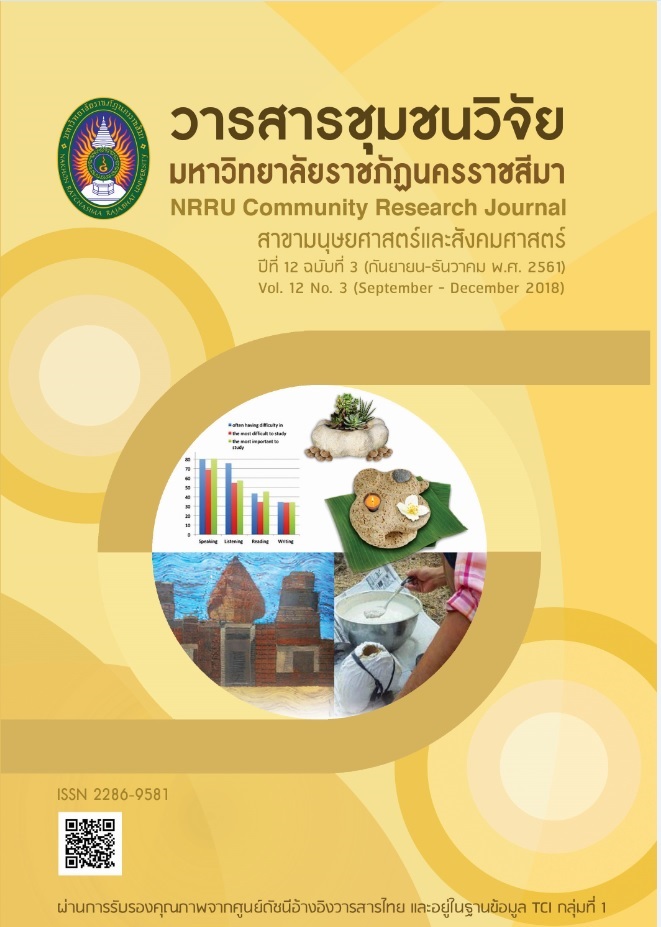ORGANIZATIONAL CULTURE AND LOCAL ADMINISTRATIVE ORGANIZATION EFFECTIVENESS
Keywords:
Organizational culture, Competing value frameworkAbstract
Organizational culture and organizational effectiveness are manageable phenomena. It is meaning that both can be achieved if local administrators have realized the important of the organizational culture and organizational effectiveness and how it grows and expands. This article was aimed to examine relationship between organizational culture and organizational effectiveness, and to determine types of organizational culture, that effect on each effectiveness model in local administrative organization. The research based on the Denison organizational culture model; involvement culture, consistency culture, adaptability culture and mission culture and the competing value framework of Quinn and Rohrbaugh effectiveness model; human relationship model, internal process model, opened system model and rational goal model. Population was all municipality and Tambon Administrative Organization (TAO) in Thailand, and the sample consists of 60 municipalities and 60 TAOs where were selected through stratified cluster multistage sampling. The statistical analysis methods applied to this research comprised descriptive statistics and inferential statistics, such as Person correlation and linear multiple regression. The Pearson correlation analysis revealed that organizational culture model has a very highly significant relationship with organizational effectiveness (r=0.87, p<0.01). The different types of organizational culture were also predictors of each effectiveness model in local administrative organization. Furthermore, the mission culture was the most prominent of the four types in term of fostering all organizational effectiveness models.
References
ส่วนวิจัยและพัฒนาระบบรูปแบบและโครงสร้าง กรมส่งเสริมการปกครองท้องถิ่น. (2558). ข้อมูลองค์กรปกครองส่วนท้องถิ่น วันที่ 9 มีนาคม 2558. สืบค้นเมื่อ 20 มีนาคม 2558, จาก http://www.dla.go.th/work/ abt/index.jsp
อุษณี มงคลพิทักษ์สุข. (2556). ภาวะผู้นําเต็มขอบเขตของปลัด อบต. กับประสิทธิผลขององค์การ: การวิเคราะห์จําแนกพหุ. วารสารร่มพฤกษ์, 31(2), 19-48.
_______. (2560). วัฒนธรรมองค์กรปกครองส่วนท้องถิ่น ยุคไทยแลนด์ 4. วารสารร่มพฤกษ์, 35(2), 143-164.
Denison, D. R. (1984). Bringing corporate culture to the bottom line. Organizational Dynamics, 13(2), 4-22.
_______. (1990). Corporate culture and organizational effectiveness. New York : John Wiley & Sons.
Denison, D. R., & Fey, C. F. (2003). Organisational culture and effectiveness: Can American theory be applied in Russia?. Organisation Science, 14(6), 686-706.
Denison D. R., & Mishra, A. K. (1989). Organizational culture and organizational effectiveness: A theory and some preliminary empirical evident. Academy of Management Best Paper Proceedings, 168-172.
_______. (1995). Toward a theory of organizational culture and effectiveness. Organization Science, 6(2), 204-223.
Denison, D. R., & Neale, W. S. (1996). Denison organisation culture survey: Facilitators guide. Ann Arbor, MI: Aviat.
Denison, D. R., Haaland, S., & Goelzer, P. (2003). Corporate culture and organizational effectiveness: Is there a similar pattern around the world ? Advances in Global Leadership, 3, 205-227.
_______. (2004). Corporate culture and organizational effectiveness: Is Asia different from the rest of the world? Organizational Dynamics, 33(1), 98–109.
Denison, D. R., Lief, C., & Ward, L. W. (2004). Culture in family-owned enterprises: Recognizing and leveraging unique strengths. Family Business Review, 17(1), 61-7.
Kotrba, L. M., Gillespie, M. A., Schmidt, A. M., Smerek, R. E., Ritchie, S. A., & Denison, D. R. (2012). Do consistent corporate cultures have better business performance? Exploring the interaction effects. Human Relations, 65(2), 241-262.
Quinn, R., & Rohnbaugh, J. (1983). A spatial model of effectiveness criteria: Toward a competing value approach to organizational analysis. Management Science, 29(3), 363-377.
Sackmann, S. A. (2011). Cultural complexity in organizations: The value and limitations of qualitative methodology and approaches. In C. L. Cooper, S. Cartwright, and P. C. Earley (Eds.), The international handbook of organizational culture and Climate (pp. 143-163). Chichester, UK : Wiley.
Sheikhalizadeh, H. M . (2014). Effects of organizational culture on organizational effectiveness in Islamic Azad Universities of Northwest of Iran. Indian Journal of Fundamental and Applied Life Sciences, 4(s3), 250-256.
Shirvani, S. D. N., Ghasemi, H., & Alizadeh, S. (2015). Comparison of the traits of the organizational culture of health-care system with treatment system within the city of Amol (based on Denison model). Nature and Science, 13(1), 61-68.
Panyachareon, S. (2015). Book Review: Handbook of Public Administration (Third Edition). Thai Journal of Public Administration, 13(1), 151-163. (In Thai)
Wanjiku, N. A., & Agusioma, N. L. (2014). Effect of organisation culture on employee performance in non govermental organizations. International Journal of Scientific and Research Publication, 4(11), 1-12.
Yilmaz, C., & Ergun, E. (2008). Organizational culture and firm effectiveness: An examination of relative effects of culture traits and the balanced culture hypothesis in an emerging economy. Journal of World Business, 43(3), 290–306.
Zakari, M., Poku, K., & Owusu-Ansah, W. (2013). Organisational culture and organizational performance: Empirical evidence from the banking industry in Ghana. International Journal of Business, Human and Technology, 3(1), 95-107.





